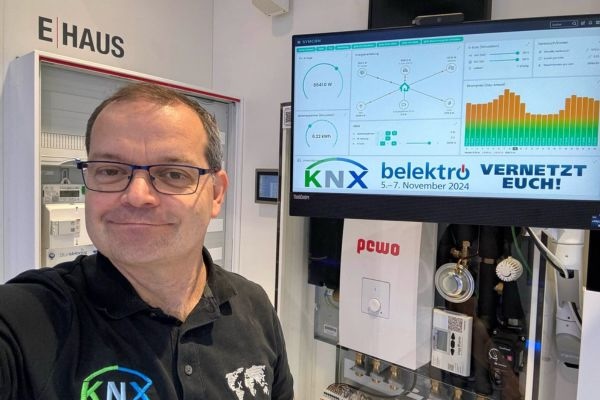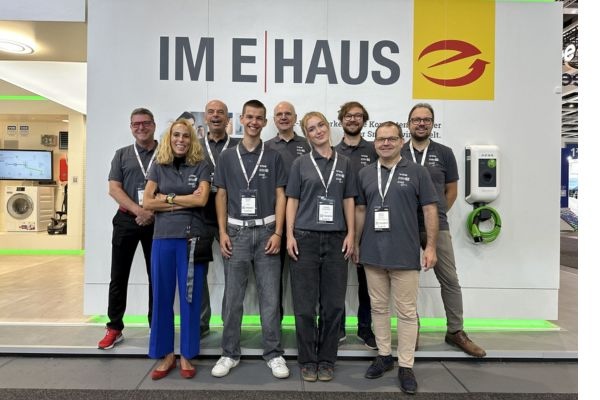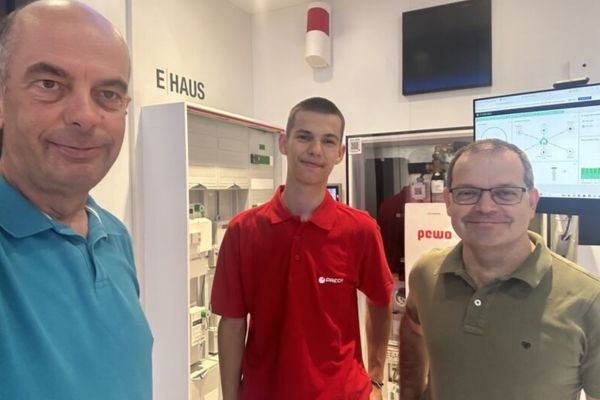
In this interview with Katie Rose, Marco Koyne discusses how international KNX professionals can work together to address climate change and nurture the next generation.
KNXtoday: How, why and when did you get involved with KNX, and what are your current roles?
MK: As a child, I was interested in repairing things – when my parents wanted to throw away machines, I’d say “No, let me see if I can repair it.” Very often, I found it was just a minor fault, and as a result, I became increasingly interested in electricity. Whilst training as an electrical installer between 1995 and 1997, I was introduced to smart home and smart building automation, and caught the KNX bug.
To gain more in-depth knowledge, I trained as an electrical engineer in building automation which is the key to my success today. I completed my training whilst working for a great company, worked for a European solar installation company in Spain and then as a computer administrator for German telecom. Finally, in 2003, I set up my own company, Koyne System Elektronik for smart homes and buildings and joined KNX Germany.
Today I’m the Chair of KNX Professionals Germany, a group of professional KNX installers that meets three or four times a year to share knowledge and advance KNX technology. At trade events, we show all kinds of people what is possible, whether they are an architect, lay person or family wanting to build a new house or to renovate an apartment. By combining KNX with new technologies such as voice-controlled systems, apps, the Internet of Things (IoT) and many other systems, we show how there’s nearly no limit to what can be done.

KNXtoday: You’ve worked on many different KNX projects including the G7 conference – tell us more about this and some other highlights.
MK: I’ve worked on more than 400 projects over the last 20 years, from small to large scale.
The G7 Conference (2007) was looking for a way for world leaders to call their assistants without having to move, because turning their backs on other leaders would be an affront. The assistants would consult a specialist team when the leaders needed to access in-depth knowledge to answer a question. I devised a solution that enabled the leaders to alert them by pressing a button on their desks. It was fascinating to see that only 30% of the conference discussions were shared with the press.
I also enjoyed working on the Waldorf Astoria Hotel, here in Berlin. It was a great experience to programme the President’s Suite, including the panic room, which is a slightly smaller copy of the normal President’s apartment.
Another project was the nhow Berlin, a music hotel on the river Spree where you can order a guitar or other instrument to be brought to your room. It’s fun to see how they play with light in the hotel design. They also have a music studio where you can record your own CDs overlooking Berlin – if you have the money to pay for it! As I played in a jazz funk band, I was curious to see how the studio worked – it’s linked to the famous Hansa Studios, where the Beatles recorded.
KNXtoday: November is KNX Sustainability Month, what role do you see KNX playing in helping build a more sustainable future?
MK: Today the focus is on energy management. This year the European Union issued the Energy Performance of Buildings Directive which means architects have to implement energy management automation systems in phases – firstly in new buildings, then for renovations or reconstructions of existing or older houses, and finally for housing estates and apartment blocks. Step by step, it will require everyone to become more energy efficient, which will significantly influence our climate. There’s a lot of work to do, as we go beyond existing solutions and develop new technologies.
Also, Time of Use (ToU) tariffs are being introduced in many countries including Germany, prioritising the importance of energy efficiency and costs. KNX energy management systems can forecast the price of energy in the next 24 hours and indicate the cheapest way to charge the car, wash the dishes or use the washing machine using different types of energy – gas, solar, electricity or wind. For example, during November or December, wind power is plentiful and cheap in Germany and can be used to charge a car battery during the night.
KNX also creates energy efficiency and sustainability by combining different disciplines such as heating, lighting, blinds, audio alarms and car charging, with multiple sensors. There’s a lot of technology behind this, but that’s not of interest to most customers. They just need a system that will contribute to the smooth running of daily life and meet their priorities.

KNXtoday; What solutions do you see emerging from international KNX partnerships as Europe faces climate change?
MK: As changes occur across different climate zones, international exchanges can help discover and integrate solutions. The first cross-national KNX Professionals conference involving KNX Professionals Italy and KNX Professionals Germany took place in Italy in June 2024. As Germany is becoming warmer, some of the Italian solutions were helpful for us, and they were interested in our energy management systems. We need more of these conferences – it’s a lot of work, of course, but there’s so much potential. That’s the great advantage of our KNX family – we can learn from each other and work together.
KNXtoday: Do you think there’s a potential for KNX professionals to have an impact at government level potentially by presenting solutions?
MK: We would like to, but we’re up against the stronger lobby power of energy companies. Also as systems integrators or company employees, we don’t have the capacity to do the work involved – it would take too much time and prevent us from doing our normal work. I don’t know how the KNX Association could have an influence at national and EU level, but there must be ways.
Don’t forget that, as part of capitalism, others in the industry want to force customers to buy and become dependent on their proprietary systems, which is not sustainable. We must be more energy efficient, so KNX professionals have to effect change on the ground by exchanging ideas, learning and collaborating internationally.
KNXtoday: How can KNX Professionals work with architects and planners to help improve sustainability?
MK: Architects and planners worldwide need to consider not only design, but also the impact of technology, and should consult systems integrators about what it means to install an energy management system in a building.
Sometimes, we are introduced to projects too late, after decisions have been made by architects and planners. For example, in a large office block which I integrated, we worked on the heating system, but the ventilation system was planned separately. As a result, the systems don’t talk to each other and customers renting the offices complain that the ventilation blows in cold air whilst the underfloor heating is active. It’s important to flag up and show how to prevent situations like this.
As KNX has more than 500 manufacturers worldwide, we have so many possibilities and products to solve complex problems. It would be good to hold conferences with architects and planners so we can work together to meet legal requirements and increase the sustainability of buildings.

KNXtoday: As young people face the most impact of climate change, tell us about your mentoring initiative at Berlin Electrical Fair this November.
MK: We introduced our mentoring initiative at the IFA show in Berlin this September at the ZVEH EHaus, a show house where we demonstrate how KNX can be used to control virtually everything. In German we say ‘Wir bilden aus EHaus’ which sounds better than the English translation – ‘We train in the EHaus’. The idea is to give young people the opportunity to learn about the technology behind the workings of the EHaus – including the little things that provide comfort, such as a light coming on when you open the dishwasher to help you see your dishes. We also give them the opportunity to present the techniques they have learned in their own language, which gives them confidence and helps them grow personally. There are many career opportunities in this area, so we want to support young people who are looking for direction and share the spirit of KNX with them.
KNXtoday: What role do you see AI playing in technological innovation as we move forward?
MK: AI will play a role, but we need to see it as an instrument that can help us and not the holy grail. It could, for example, be used improve automation, but we need to continue testing, improving and adapting it as a tool. We need to master AI, rather than it mastering us.
KNXtoday: As a supporter of the Women in KNX initiative, what do you feel can be done to improve equal opportunities for women in the trades?
MK: Our founder, Katja Schuster, is doing a great job. Since launching at Light + Building 2024, Women in KNX is growing, step by step. As we realise that it’s hard to recruit women, one of the aims of our young people’s initiative at the EHaus is to encourage young women who are interested in exploring technical professions. Restrictive cultural and family attitudes need to be challenged – there should be no barriers to women pursuing technical careers.
One of the greatest things we can do is promote women working in the field, show that they are enjoying their careers and that they can bring a different point of view to men. These role models can help inspire both young women interested in training and older women who might want to change profession.
In Germany, our language is gendered which I don’t like – there’s no need for it. For years, I’ve also been fighting to level the gender pay gap, as I cannot understand why a woman should earn less money than a man in any profession.
KNXtoday: Is there anything else you’d like to say to our readers?
MK: What I’d like to see by 2030, is a great European conference of KNX Professionals to demonstrate the amazing potential of KNX and share solutions for the future.
Marco Koyne, Dipl -Ing (BA) is an electrical engineer of building automation and founder of Koyne System Elektronik and the Chair of KNX Professionals Deutschland e.V.













